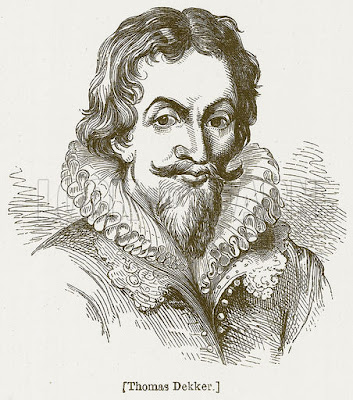Golden slumbers fill your eyes
Smiles await you when you rise
Sleep, pretty darling, do not cry
And I will sing a lullaby
There’s no denying it -- Sir Paul McCartney stole the lyrics to this song from Elizabethan dramatist, Thomas Dekker.
Here’s an excerpt from Dekker’s poem, “Cradle Song,” from the 1603 comedy, Patient Grissel, which Dekker co-wrote:
Golden slumbers kiss your eyes,
Smiles awake you when you rise;
Sleep, pretty wantons, do not cry,
And I will sing a lullaby
I like “pretty wantons” ever so much more than “pretty darling.” “Wanton” originally meant “undisciplined.” For the Elizabethans, wanton usually had a sexual implication – “lascivious” is a good synonym. Here, the speaker clearly is charmed by the “wantons” he is singing to sleep – he uses the word affectionately, I think – but he knows they are bad girls nonetheless.
 |
| " . . . and wantons ran berserk!" |
Dekker and his co-authors stole the idea for their play from the Canterbury Tales, so they wouldn’t exactly be coming into equity with clean hands if they somehow rose from the dead and sued the Beatles. (Sorry for the obscure legal reference, but occasionally stuff I learned my first year of law school just comes bubbling up, like the oil on Jed Clampett’s farm.)
The two previous 2 or 3 lines posts have featured two other Paul McCartney songs from the medley that closes the last album the Beatles ever recorded together, Abbey Road.
If you’ve read them, you know all about how I smuggled a cassette recorder and a tape of Abbey Road on a trip to visit the University of Missouri my senior year of high school. You also know that I visited the university bookstore and attended the Missouri-Oklahoma football game that weekend.
 |
| Redford and Newman |
Another highlight of that trip was seeing Butch Cassidy and the Sundance Kid – a movie I’ve seen many times since, and for which I still have a soft spot.
Butch Cassidy and the Sundance Kid was released at about the same time as The Wild Bunch. Both are westerns, and both end with the title characters making their last stand against a horde of south-of-the-border soldiers. The long, bloody closing sequences of both movies were so masterfully choreographed that they were almost too intense to sit through.
But Wild Bunch (like Bonnie and Clyde) ends with the protagonists absorbing dozens (if not hundreds) of bullets and dying in agonizing slow motion, while Butch and Sundance ends in a merciful freeze-frame – we know the fate of our heroes, but we are spared the gory details.
 |
| Fade to black (actually sepia) |
Butch and Sundance is a very odd movie, and not really a very good movie – despite the on-screen chemistry of Paul Newman and Robert Redford and its many other charms.
(By the way, the studio originally wanted Newman to pair with Steve McQueen, but there was a dispute on how the superstars would be billed. The "Sundance" role was next offered to Jack Lemmon, of all people. Warren Beatty and Marlon Brando were also considered for the role eventually given to Redford, who became a major star as a result.)
The movie was hugely successful at the box office (its gross was $102 million but it cost only $6 million to make) and it won Oscars for best original screenplay, best musical score, and best song.
 |
| Newman with co-star Katharine Ross |
But the movie is “afflicted with cinematic schizophrenia,” to quote the Time magazine review. At times, it is a shticky buddy picture. At other times, it is a movie about doomed young lovers – somewhat reminiscent of Bonnie and Clyde. A lot of people are killed in the movie, but a lot of wisecracks are exchanged.
And while the Burt Bacharach-Hal David musical score is wonderful, it doesn’t make a lot of sense in the context of the movie.
Here’s my favorite piece of music from the movie, an absolutely wonderful little number called “South American Getaway,” which accompanies an otherwise silent five-minute sequence of Butch and Sundance robbing banks in Bolivia and being pursued by the hapless local police:
“South American Getaway” is performed by the Ron Hicklin Singers, a group of Los Angeles studio singers who recorded many TV theme songs (including Batman, Flipper, That Girl, Love American Style, Happy Days, and Laverne and Shirley) and TV commercials (one of the group’s members was the voice of “Tony the Tiger” in Frosted Flakes commercials) and were the backup singers on many top-40 hits (including songs recorded by Cher, Paul Revere and the Raiders, the Monkees, the Partridge Family, and Gary Lewis & the Playboys).
Here’s a demo reel for the Ron Hicklin Singers, which will give you a better idea of just how ubiquitous they were:
Here’s “Golden Slumbers”:
Here’s a link you can use to order "South American Getaway" from Amazon:




No comments:
Post a Comment